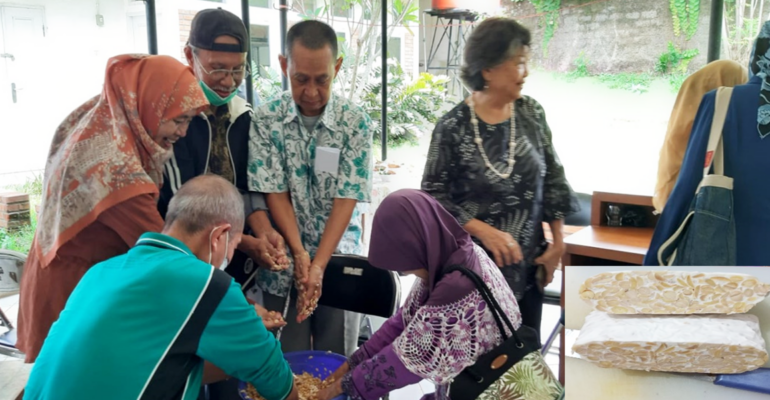Continuing to be Productive, Members of the Association of Retired IPB University Employees Participate in Tempe Making Training

Paguyuban Pensiun Pegawai IPB University (P3IPB) organised Tempe Making Training. This activity is a manifestation of the spirit of P3IPB members to continue to be productive. The training was located at the P3IPB Secretariat, Jalan Palem No 4 Lecturer Housing (Perumdos), IPB Dramaga Campus.
The training was attended by 11 P3IPB members, 4 mothers of Perumdos residents and 4 IPB University students. In the practice of making tempeh, participants were divided into five groups. The instructors in this training were Prof Fransiska Rungkat and Dr dra Suliantari.
To make tempeh, soya beans must first be soaked for 48 hours. Therefore, the training committee had prepared the soya beans two days earlier by washing, boiling and soaking the soya beans. That way, at the time of the training, participants immediately peeled and washed the soaked soybeans.
After being cleaned from the skin, the soybeans were steamed for 15 minutes. Next, the soybeans were drained from the water and cooled, then sprinkled with laru (yeast for tempeh) and mixed well.
The participants learnt to wrap the tempeh ingredients using two types of wrapping materials, banana leaves and plastic. Participants took home the packaged tempeh ingredients. They also had to report their tempeh results after being stored for 36-48 hours through photo or video documentation to the P3IPB WhatsApp group.
From the evaluation of the training tempe products, all groups succeeded in making tempe well. The participants seemed happy to enjoy the tempeh from the P3IPB training.
“In the future, it is hoped that participants from P3IPB members can become tempeh entrepreneurs with various processing innovations,” hoped Prof Fransiska Rungkat. In addition, in the future she also encourages the utilisation of beans with excellent nutrition, such as kecipir, for example. (*/Rz) (IAAS/RUM)



